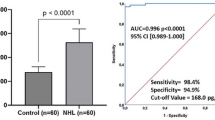Abstract
Syndecans are among those transmembrane PGs which act via their heparan sulphate chains as receptors for different matrix elements (e.g. collagen I–III, fibronectin, thrombospondin, tenascin) and co-receptors for growth factors (e.g. bFGF, aFGF, GM-CSF, IL-3, IFNg). We hypothesized that there is a positive relationship between the expression of syndecan-1 (CD138) and treatment response in non-Hodgkin’s lymphoma. To identify the expression of syndecan-1 (CD138) in cases of non-Hodgkin’s lymphoma and to correlate its expression with treatment response and disease stage, this study was carried out as a cross-sectional study and included 30 patients with non-Hodgkin’s lymphomas attending Suez Canal University Hospital; diagnosis of patients was made by routine histological and immunohistochemical examination. CD138 mRNA expression was assessed by TaqMan technique using real-time PCR method. There was increased expression of CD138 mRNA in patients with follicular lymphoma than in patients with diffuse large B cell lymphoma (6.25 versus 3.46, respectively) (p ≤ 0.05). Syndecan-1 (CD138) mRNA expression from peripheral blood may be a useful marker for follicular lymphoma and can be used as a marker of treatment response in patients with follicular and diffuse large B cell lymphoma.



Similar content being viewed by others
References
Alexander CM, Reichsman F, Hinkes MT, Lincecum J, Becker KA, Cumberledge SC, Bernfield M (2000) Syndecan-1 is required for Wnt-1-induced mammary tumorigenesis in mice. Nat Gen 25:329–332
Bayer-Garner IB, Sanderson RD, Dhodapkar MV et al (2001) Syndecan-1 cd138; immunoreactivity in bone marrow biopsies of multiple myeloma: shed syndecan-1 accumulates in fibrotic regions. Mod Pathol 14:1052–1058
Blackhall FH, Merry CLR, Davies EJ, Jayson GC (2001) Heparan sulfate proteoglycans and cancer. Br J Cancer 85:1094–1098
Carbone A, Gloghini A, Gattei V, Degan M, Improta S, Aldinucci D, Canzonieri V, Perin T, Volpe R, Gaidano G, Zagonel V, Pinto A (1997) Reed-Sternberg cells of classical Hodgkin’s disease react with the plasma cell-specific monoclonal antibody B-B4 and express human syndecan-1. Blood 89:3787–3794
Fujiya M, Watari J, Ashida T, Honda M, Tanabe H, Fujiki T, Saitoh Y, Kohgo Y (2001) Reduced expression of syndeca1 affects metastatic potential and clinical outcome in patients with colorectal cancer. Jpn J Cancer Res 92:1078–1081
Khotskaya YB, Dai Y, Ritchie JP, MacLeod V, Yang Y, Zinn K et al (2009) Syndecan-1 is required for robust growth, vascularization, and metastasis of myeloma tumors in vivo. J Biol Chem 284:26085–26095
Negaard HF, Svennevig K, Kolset SO et al (2009) Alterations in regulators of the extracellular matrix in non-Hodgkin lymphomas. Leuk Lymphoma 50(6):998–1004
O’Connell P, Pinkus GS (2004) CD138 (syndecan-1), a plasma cell marker immunohistochemical profile in hematopoietic and nonhematopoietic neoplasms. Am J Clin Pathol 121:254–263
Post J, Vooijs WC, Bast BJ, De Gast GC (1999) Efficacy of an anti-CD138 immunotoxin and doxorubicin on drug-resistant and drug-sensitive myeloma cells. Int J Cancer 83:571–576
Reiland J, Ott VL, Lebakken CS et al (1996) Pervanadate activation of intracellular kinases leads to tyrosine phosphorylation and shedding of syndecan-1. Biochemical J 319:39–47
Sanderson RD, Lalor P, Bernfield M (1989) B lymphocytes express and lose syndecan at specific stages of differentiation. Cell Regul 1:27–35
Sanderson RD, Sneed TB, Young LA, Sullivan GL, Lander AD (1992) Adhesion of B lymphoid (MPC-11) cells to type I collagen is mediated by the integral membrane proteoglycan, syndecan. J Immunol 148:3902–3911
Sasisekharan R, Shriver Z, Venkataraman G, Narayanasami U (2002) Roles of heparan-sulphate glycosaminoglycans in cancer. Nat Rev Cancer 2:521–528
Sebestyén A, Kovalszky I, Mihalik R et al (1997) Expression of syndecan-1 in human B cell chronic lymphocytic leukemia. Eur J Cancer 33:2273–2277
Sebestyén A, Berczi L, Mihalik R, Paku S, Matolcsy A, Kopper L (1999) Syndecan-1 (CD138) expression in human non-Hodgkin lymphomas. Br J Haematol 104:412–419
Soukka T, Pohjola J, Inki P, Happonen R-P (2000) Reduction of syndecan-1 expression is associated with dysplastic oral epithelium. J Oral Pathol Med 29:308–313
Sutcliffe M, Oscier D, Wright DH (2000) Syndecan-1 (CD138) expression in human non-Hodgkin’s lymphomas. Br J Haematol 110:239–240
Swerdlow SH, Campo E, Harris NL et al (2008) WHO classification of tumours of haematopoietic and lymphoid tissues, 4th edn. IARC Press, Lyon
Vassilakopoulos TP, Kyrtsonis MC, Papadogiannis A et al (2005) Serum levels of soluble syndecan-1 in Hodgkin’s lymphoma. Anticancer Res 25:4743–4746
Wołowiec D, Dybko J, Wróbel T, Urbaniak-Kujda D, Jaźwiec B, Tomaszewska-Toporska B, Kapelko-Słowik K, Potoczek S, Kuliczkowski K (2006) Circulating sCD138 and some angiogenesis-involved cytokines help to anticipate the disease progression of early-stage B-cell chronic lymphocytic leukemia. Mediators Inflamm 2006(3):42394
Wu YH, Yang CY, Chien WL, Lin KI, Lai MZ (2012) Removal of syndecan-1 promotes TRAIL-induced apoptosis in myeloma cells. J Immunol 188(6):2914–21
Conflict of interest
All authors agreed that there is no conflict of interest.
Author information
Authors and Affiliations
Corresponding author
Rights and permissions
About this article
Cite this article
Abd elmohsen, S.E., Attia, F.M., Elbahie, H.M. et al. CD138 mRNA expression from peripheral blood of patients with follicular and diffuse large B cell lymphoma: relation to disease progression and treatment response. Comp Clin Pathol 23, 855–859 (2014). https://doi.org/10.1007/s00580-013-1703-y
Received:
Accepted:
Published:
Issue Date:
DOI: https://doi.org/10.1007/s00580-013-1703-y




